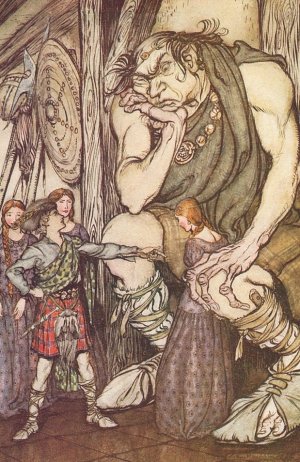| Library / Literary Works |
The Princess and the Fisherman
Once upon a time something happened. If it had not happened, it would not be told.
There was once a fisherman, neither very well off nor very poor, but he was young, with a mustache that curled fiercely at the ends, you know, and a fine-looking fellow. Whenever he passed the imperial palace, the
emperor's daughter sent for him, bought his fish, and gave him ten times as much money as they were worth.
Our fisherman was spoiled by this wealth, and whenever he had nice fresh fish he took them to the palace; not a day passed that the princess did not buy fish if the fisherman went by.
One day, while paying for the fish, the princess pressed his hand, the fisherman blushed as red as a beet, and cast down his eyes, but first gave her one loving glance, for he had understood that she was willing he should do so.
Then he entered into conversation with her, and took good care not to say any thing stupid.
The next time the princess bought fish he began to talk about them at great length, and made her comprehend that he had understood her feelings, and that the fire of love which was consuming her burned no less hotly in his heart than in her own.
Another time he spoke still more freely, and the princess learned that he was unmarried; she was, besides, much pleased with his clever answers, and as he was very attractive the royal maiden finally fell in love with him. She gave him a purse filled with money to purchase handsome clothes, and told him to come back afterward and show himself to her.
After he had bought garments like those worn by gentlemen, he put them on and returned to the princess. She would scarcely have recognized him, for even his gait and bearing had become as stiff as a noble's.
At last, unable to repress the love that glowed in her heart, the emperor's daughter told him that she would marry him.
The fisherman did not know much, but he was aware that such a dainty morsel wasn't meant for his bill, and he could hardly believe what he heard with his ears and saw with his eyes; but when the princess assured
him that she wasn't joking, he accepted her hand, though to tell the truth with many doubts and blushes.
The marriage did not exactly suit the emperor, but as he loved his daughter and she was her parents' only child, he yielded to her wishes. The princess gave the fisherman another purse filled with money, and told
him to buy himself still handsomer clothes. When he returned, in garments that fairly glittered with gold, the royal maiden presented him to the emperor, and the monarch betrothed them to each other.
Ere long a magnificent imperial wedding was celebrated. When the company sat down to enjoy the banquet, a soft-boiled egg, which, according to ancient custom, only the bride and bridegroom were permitted to eat,
was brought to the wedded pair. When the husband was about to dip a bit of bread into the egg, the princess stopped him, saying:
"I must dip first, because I am the daughter of an emperor, and you are a fisherman."
The bridegroom made no reply, but rose from the table and vanished. The guests, who did not know what had happened, looked at one another and asked in surprise what this meant, for they had not heard that the
emperor's son-in-law had formerly been a fisherman.
The bride repented her imprudence, bit her lips, and wrung her hands. She ate what she was compelled to swallow, but she might just as well have thrown it behind her, for not a morsel did her any good.
After the feast she went to her room, but all night long she could not once close her eyes or fall asleep, she was so sorrowful. She thought of her bridegroom so constantly that she was afraid she would fall ill
from longing. Her principal grief was that she did not know why he had gone away without saying even one word.
The next day she went to the emperor and told him she was seized with so great a longing for her husband that she was going to follow him till she found him. The emperor tried to detain her, but she would not listen and set out on her journey.
She searched up and down the whole city, but did not find him anywhere. Then she wandered from place to place till she met him serving in a tavern.
As soon as she saw him she went up and spoke to him, but he pretended not to know her, turned his head away, made no answer, and went about his business.
The princess followed him everywhere, begging him to say just one word to her, but in vain. When the landlord saw that the stranger was to blame for the interruption in the work, he said:
"Why don't you let my servant finish his work in peace? Don't you see he is dumb? Be kind enough to go away from here, if you are a respectable woman."
"He isn't dumb," she cried, "this is my husband, who deserted and fled from me on account of a fault of mine."
All the people in the tavern stood still in astonishment when they heard her words, for she was not joking; but the landlord could not believe it, he thought it would be impossible for a man who could speak to live a whole week without saying even one word, and every body really knew him as a dumb man, made him understand by signs, and liked him for his industry.
The princess then entered into an agreement with them all, that she would induce him to speak within three days if they would only allow her to stay with him, but if she did not succeed she would be hung. This
agreement was put in writing and shown to the magistrates for their sanction. When the contract was concluded, the three days' trial was arranged to begin the next morning.
The fisherman at first knew nothing about this agreement, though he heard of it afterward, but the emperor's daughter never left his side.
"My beloved husband," she said, "you know I am to blame. I chose you because I loved you; I swear that I will never commit such a blunder again; have pity on me, speak one word to me, save me from the disgrace
that is killing me. I know you have a right to be angry, but for the sake of my love, forgive me."
The fisherman turned his head toward her, shrugged his shoulders, and pretended that he did not know her, and did not understand what she was talking about. One day, two days passed, and he did not even say boo.
When the third came the princess was terribly frightened, and wherever the dumb man went she followed, beseeching him to say one word to her.
But the fisherman, feeling that she was softening him by her entreaties, fled like a savage that she might not assail him with tears, and pretended his heart was a lump of ice; but she did not cease imploring him a thousand times, so tenderly that it would have softened even a wild beast.
At last the third day also passed, and the fisherman had not even said baa.
Every body wondered over these things. Nothing was talked of in the whole city, except the mute servant at the tavern and the beautiful, charming girl, who, it was supposed, had mistaken the dumb man for some one
else, and had now brought herself into trouble.
The next day the gallows was ready, and the whole population gathered around it to witness the end of the affair.
The magistrates were summoned to the place, and, against their will, compelled to execute what was in the agreement.
The executioner came, and called upon the princess to submit to the penalty, since she had not succeeded in fulfilling the obligations she had imposed upon herself; the girl turned once more to the fisherman, and,
sobbing bitterly, tried to soften his heart, but in vain. When she saw and understood that no escape was possible, she loosed her hair and let it fall over her shoulders, wailing so piteously that it was enough to make even wood and stone weep for her, and so walked toward the place of execution. All the people, old and young, were weeping around her, yet could not help her.
On reaching the gallows, she once more gazed hopefully at the dumb man, who had come with the crowd, but stood as if he were perfectly unmoved, and said to him:
"My dear husband, save me from death; you know my love for you, do not let me perish so ignominiously. Speak but one word and I shall be delivered." But the man only shrugged his shoulders and glanced backward
across the fields.
The executioner stood with the noose in his hand; two assistants led her up the ladder, and the hangman slipped the rope around her neck. One moment more, and the princess would have been a corpse! But just at the instant the executioner was going to let her swing out into the empty air, the fisherman raised his hand, shouting: "Hi! hi! stop!"
They all stood motionless, tears of joy streamed from every eye as the hangman took the noose from the prisoner's neck. Then the fisherman, looking at the royal maiden, said three times:
"Will you say fisherman to me again?"
"Forgive me, my dear husband," the princess hastened to reply, "I have only said it once, and that was by mistake. I promise you not to do so again."
"Let her come down, she is my wife."
He took her by the hand, and they went home together.
Afterward they lived in peace and happiness, and if they haven't died, they are living still.
Into the saddle then I sprung,
This tale to tell to old and young.



